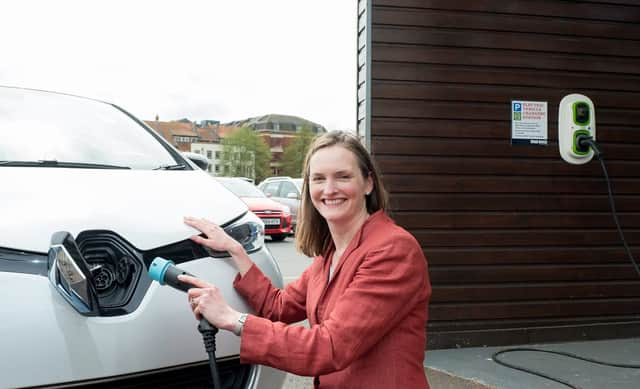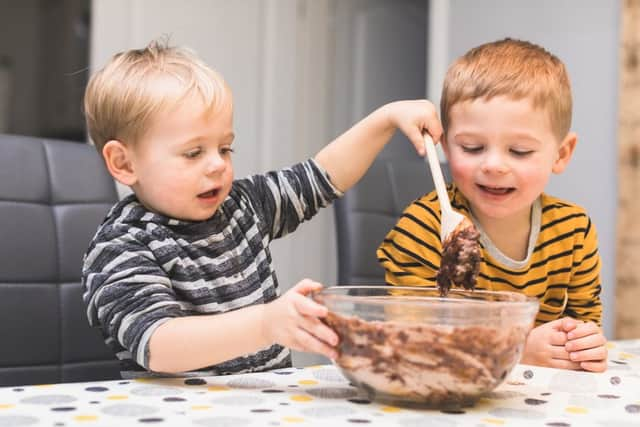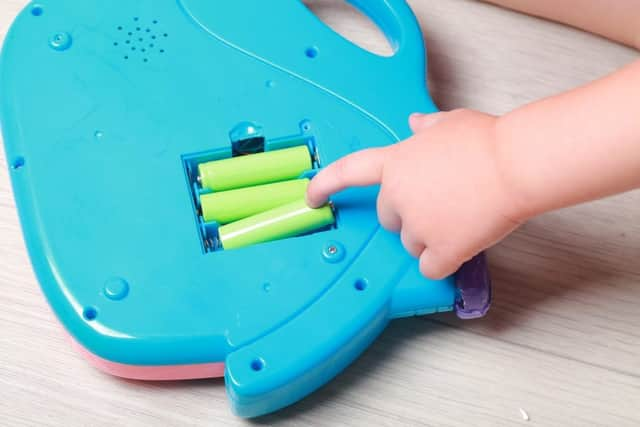Saving the planet - how we can all do our bit


Hello and welcome to my new weekly column on living a greener life.
My name is Angela Terry and I’m an environmental scientist and mum of three.
I’m here to highlight the easiest and most effective ways of changing the way we live to help protect the planet and the things we love.
Advertisement
Hide AdAdvertisement
Hide AdWith all the confusing – and often contradictory – information out there, I will share the best practical tips, simple swaps and straightforward advice.
I’ll also be throwing in the latest eco-friendly celeb news for good measure!
I hope to prove that going green isn’t necessarily expensive or difficult – and that it can often be fun.
There are so many simple things we can all do to cut our carbon footprints.
Advertisement
Hide AdAdvertisement
Hide AdOften these changes bring other benefits too, like saving you money or boosting your health and wellbeing.Going green is about wasting less, being creative and, often, remembering good old-fashioned tips from times gone by.
You might hear some people say that it’s down to governments to tackle the climate crisis and that personal action just isn’t worth it.
Of course, it goes without saying that politicians have a crucial responsibility.
They need to take the lead and deliver the policies that encourage low-carbon lifestyles and ensure big polluters pay, so we safeguard our future.
Advertisement
Hide AdAdvertisement
Hide AdBut the truth is that we can only meet our climate targets if we all do our bit.
After all, it’s personal action – when it’s adopted on a wide scale – that drives government decision making.
Likewise, if everyone starts buying greener products and services then, businesses will react quicker and invest in cleaning up their own act too.
It’s about government, business and personal action reinforcing each other.
Advertisement
Hide AdAdvertisement
Hide AdTo achieve the monumental cuts in carbon pollution that are so urgently needed, we all have a part to play.
Our kids and grandchildren are counting on us.
Thankfully, most people now want to go green.
As someone who’s worked as a carbon scientist, green energy pioneer and at the Forestry Commission, I know this first-hand.
Friends and family are always asking me for advice on how to be more eco-friendly.Such was the demand that three years ago I set up my own social enterprise.
Called One Home, it’s the UK’s first independent source of information on green living and climate adaptation.
Advertisement
Hide AdAdvertisement
Hide AdIt exists to help people make informed decisions that will benefit them and the world around them.
That’s what I will be doing in this column too.
I hope it will inspire you to go green!
How to give eco-friendly presents this Christmas
In December the average British family spends nearly a third more than other months, according to the Bank of England.
In these cash-strapped times that’s a lot of money – especially when you consider that Britons are said to receive 81 million unwanted presents each year, roughly three per household.What a waste!
All that money and so much pollution created for no reason at all.
It doesn’t make any sense.
Advertisement
Hide AdAdvertisement
Hide AdHas the time come to give green presents instead?You don’t need to turn into the Grinch!
You can still show you care but without breaking the bank or maximising your carbon footprint.Here are my five top tips:
1. Buy preloved
You don’t need to buy new.
There are lots of websites where you can source preloved goods and toys in excellent condition – like Facebook Marketplace, Freegle, Olio, Trash Nothing and Preloved – at a fraction of the price they’d be new in-store.
2. Give experiences
With so many of us living in over-cluttered houses or flats, why not buy those you care about cinema, theatre or sporting event tickets, instead of yet more stuff?
Advertisement
Hide AdAdvertisement
Hide AdKids and teens can give the grown-ups in their lives vouchers for chores like cleaning the car or for treats like a lie-in and breakfast in bed.
3. Make your own
Nothing’s more special than a homemade present like a batch of lovingly baked brownies or a jar of jam.


YouTube is awash with ideas for edible gifts like cookie mix jars, flavoured salts or DIY tea bags.
Alternatively, this could be an opportunity for you to get into crafting and upcycling by making simple bags, cushion covers or scrunchies from old curtains, duvet covers or clothes.
4. Plant a tree
Advertisement
Hide AdAdvertisement
Hide AdInstead of a physical gift, you could plant a tree on a loved one’s behalf, via The National Trust, or make a donation to The Woodland Trust in their name.
5. Do you need to give at all?
The most eco-friendly Christmas gift is one that doesn’t exist.
With household budgets tight in the wake of the COVID pandemic and rising energy prices, money-wise it makes sense to reduce the number of presents you give.
Just make sure to agree with your friends and family first.
For example, you could decide with family members to give only to the children or do a secret Santa for the adults or offer services such as babysitting or meal cooking instead of physical gifts.
Celebrity spot


Advertisement
Hide AdAdvertisement
Hide AdSir Bob Geldof (photo: Shutterstock) is refusing to pay his water bill because Southern Water is dumping raw sewage into the sea off the coast of Kent where he lives.
The Boomtown Rats’ frontman has joined a non-payment campaign against the utility company, which has been fined a record £90 million for illegal sewage discharges this year.
Whitstable residents started it, amid reports that people were falling ill after taking a dip off the town’s beach.
The Environment Agency has launched an investigation.
Green swap
Not having the right batteries for a child’s new toy is a Christmas morning drama too many of us have experienced.


Advertisement
Hide AdAdvertisement
Hide AdPlan ahead and buy rechargeable ones. It will save you money, stop you running out of batteries and cut your emissions too.
Fact or fiction?
As long as they’re from a sustainable source, real Christmas trees are more eco-friendly than artificial.
Fake trees tend to be made from PVC from fossil fuels, causing pollution during manufacture and long-lasting waste at end of their life.